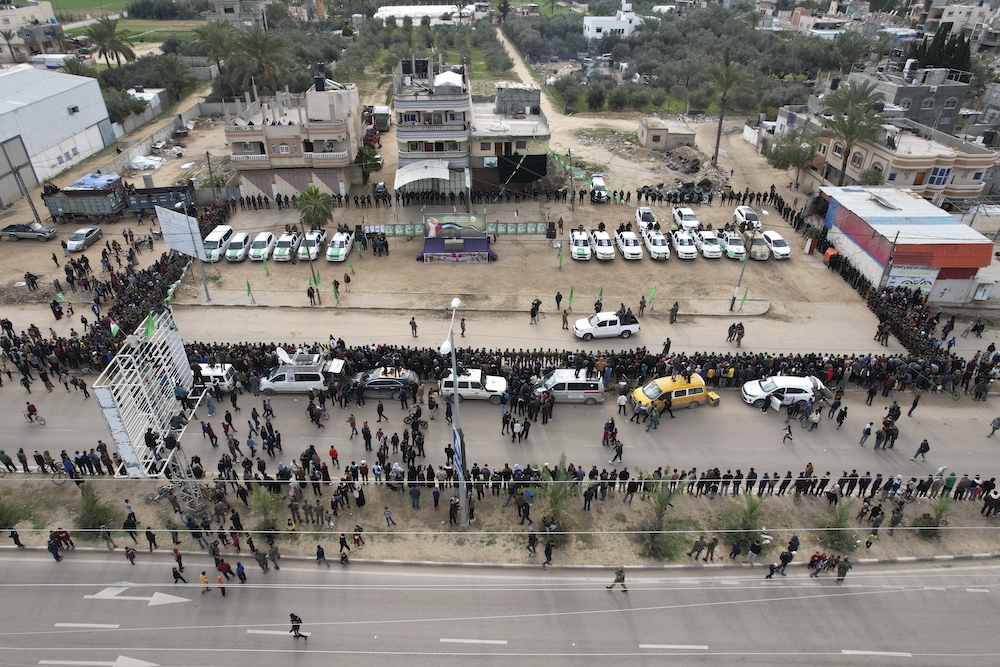JERUSALEM: On Monday, the Israeli military withdrew from its second devastating raid on Gaza’s largest hospital, Shifa, leaving it in ruins, with the walls blown out and frame blackened.
Despite the destruction, Israel claimed the battle as a victory in its battle against Hamas militants — and said it hadn’t harmed civilians sheltering inside the hospital.
But accounts from observers on the ground and the World Health Organization tell a different story.
They describe a terrifying two-week raid during which more than a dozen civilians died and others were brutally detained and trapped inside a facility with dwindling supplies.
Here’s what’s been said about the raid.
HAVE CIVILIANS AND PATIENTS BEEN KILLED?
Israel said its forces launched the surprise attack March 18. After two weeks of battles inside Shifa, the military had killed 200 militants, spokesperson Daniel Hagari told reporters Monday. He maintained that no civilians sheltering inside the hospital were harmed and said forces had provided some 6,000 Palestinians sheltering there with food, water, and medicine. The army deployed medical teams and Arabic speakers to communicate and help those inside before evacuating everyone effectively, he said.
But World Health Organization Director-General Tedros Adhanom Ghebreyesus said Sunday that 21 patients inside the hospital had died since the start of the siege. He said 107 patients had been left inside the hospital, including young children and adults in critical condition. He said they lack “health support, medical care and supplies.”
“Since yesterday only one bottle of water remains for every 15 people. Contagious diseases are spreading due to extremely unsanitary conditions, and a lack of water,” he wrote on X.
The raid triggered days of fighting for blocks around Shifa. Witnesses and journalists reported airstrikes, the shelling of homes and troops forcing residents to evacuate.
One resident, Mohammed Al-Sheikh, said Israeli fighter jets were “hitting anything moving in the area.”
Another, Bassel Al-Hilou, said seven relatives were killed in Israeli airstrikes.
“There was a massacre in my uncle’s house,” he said Monday morning, as hundreds returned to bury the dead, examine the damage or search for loved ones. “The situation was indescribable.”
The Israeli military did not comment on any civilian deaths near or outside the hospital.
WHO HAS ISRAEL ARRESTED AND DETAINED?
Israel said it arrested 900 suspected militants. Of those, Israel said, it has confirmed 500 are militants — some of them high-level commanders and members of Hamas’ top political echelon.
But accounts from the Gaza Health Ministry and Al Jazeera, a Qatari-based media network, said medical workers and journalists were among those detained and brutalized by Israeli forces.
A group of reporters was handcuffed, blindfolded and stripped of their clothes for 12 hours, a statement from Al Jazeera said. Israel’s military did not respond to an AP request for comment on the allegation.
WHAT HAPPENED AS THE RAID ENDED?
After killing and rounding up suspects inside the hospital, military spokesman Hagari said, Israeli forces retreated, exiting the compound on Monday. Two Israeli soldiers were killed and eight injured in the fighting, he said.
Al-Aqsa Martyrs Brigades, a militant group loosely linked to President Mahmoud Abbas’ Fatah movement, said its fighters had targeted Israeli forces with artillery during the operation and as forces withdrew.
Hamas also released videos of militants preparing shells that it said were directed toward Israeli forces in the hospital compound.
Hagari acknowledged that the fighting had destroyed Shifa’s emergency ward and a major hospital compound.
“Beside the success, there is a tragedy,” he said. “Because of the barricading, because of the bombs and explosives that we used in those buildings. That is the tragedy of ruining the hospital, although we tried everything we can to prevent it.”
WHY DID ISRAEL TARGET SHIFA FOR A SECOND TIME?
Since Hamas militants stormed southern Israel on Oct. 7, Israel has made Shifa a central component of its blistering counteroffensive on Gaza.
Israel faces heavy scrutiny over its two major offensives on Shifa. Hospitals receive special protections under international law. Israel says Shifa lost that protection because it is a central command and control center for Hamas. Rights groups and international lawyers say evidence to support this claim has been faulty and insufficient.
In justifying its first raid, Israel said that underneath the hospital lay a complex network of tunnels, a central command center for Hamas. Evidence produced from that raid— caches of weapons, a tunnel leading to small, rusty quarters that appeared out of use, and no scores of militants found — fell far short of the claim.
Hagari said Monday that the intelligence had been wrong and that Israel had tipped off Hamas militants at Shifa by announcing its attack plans.
“They left there because they knew we were coming,” he said. “And this time, we did something else.”
By doubling back to Shifa in mid-March, he said, forces surprised militants who had regrouped inside.
He said the military now believes militants operated mainly from the hospital wards themselves, not tunnels underneath.
As Israeli withdraws from raid on Shifa Hospital, accounts from military and witnesses differ wildly
https://arab.news/25pda
As Israeli withdraws from raid on Shifa Hospital, accounts from military and witnesses differ wildly

- Israel has killed more than 32,705 Palestinians, according to Gaza’s Health Ministry




























